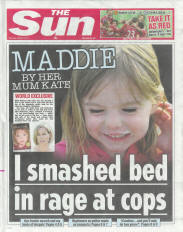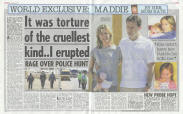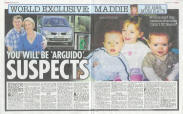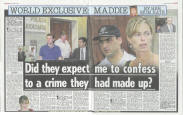KATE
and Gerry McCann had been stunned to be named as suspects over their
missing daughter Madeleine.
In this extract, edited and
abridged by ANTONELLA LAZZERI and OLIVER HARVEY, Kate tells of her
horror at learning Portuguese police were offering her a "deal" - if she
confessed to hiding her daughter's body.
THE only conclusion I could
draw was that we'd been framed, though this seemed completely
implausible.
Faced with something like
this, way beyond the sphere of your experience, it is natural to dismiss
it as impossible, but that doesn't mean it is.
When I thought about all
that had happened so far, maybe anything was possible.
In any event, it seemed
we'd underestimated the magnitude of the fight we had on our hands. Then
came the best bit. My lawyer Carlos Pinto de Abreu announced what police
had proposed.
If we, or rather I,
admitted that Madeleine had died in an accident in the apartment, and
confessed to having hidden and disposed of her body, the sentence I'd
receive would be much more lenient: only two years, he said, as opposed
to what I'd be looking at if I ended up being charged with homicide.
Pardon' I really wasn't
sure I could possibly have heard him correctly. My incredulity turned to
rage. How dare they suggest I lie' How dare they expect me to live with
such a charge against my name'
And even more importantly,
did they really expect me to confess to a crime they had made up, to
falsely claim to the whole world that my daughter was dead, when the
result would be that the whole world stopped looking for her'
"You need to think about
it," Carlos insisted. "It would only be one of you. Gerry could go back
to work." I was speechless.
Horrified
The incentive to accept
this "offer" seemed to be that if we didn't agree to it, the authorities
could or would go after us for murder, and if we were found guilty, we
might both receive life sentences.
Gerry was distraught now.
He was on his knees, sobbing, his head hung low. "We're finished. Our
life is over," he kept saying over and over again. It was excruciating
to see him like this. I love him so much and he is usually so strong.
There was a phrase Carlos
must have used about twenty times: "This is the point of no return." I
could feel myself shaking. He was a man with three daughters of his own.
"Do you want me to lie'
What would you do, Carlos'
"If one of your daughters
was missing, and this happened to you, what would you do' Would you
confess to a crime you hadn't committed, knowing full well it would mean
everyone would stop searching for her'"
"I'd consider it, yes."
Heaven help us. My
confidence in Carlos was evaporating almost as quickly as my faith in
Portuguese justice. It was one thing to make us aware of the Polcia Judicicia's proposal, and perhaps Carlos was duty bound to do that.
It was quite another,
however, to suggest we accept it. I was horrified, and told him so in no
uncertain terms.
My anger and ferocious
maternal instinct began to permeate Gerry's despair. He was regaining
his composure, his powers of reason and fighting spirit. "They've got
nothing!" he fired at Carlos. He began pointing out the many flaws in
the PJ's "evidence" and the complete absence of logic.
We'd experienced many
periods of despair since our beloved daughter had been taken away, but
this one would take some beating. Our lives, our family, our whole
future hung in the balance.
FRIDAY 7 SEPTEMBER. After a
measly two hours' sleep we got up and braced ourselves for the day
ahead. I vividly remember standing quietly for a few minutes in the
sitting room. There were several thoughts scrolling through my mind.
There's going to be a riot
when news of all this reaches people back in the UK.
There's no way our
government will stand for this. (Four months down the line and still so
naive!)
The PJ can beat me up and
throw me in a prison cell but I will not lie . . . I will do everything
I can to help Madeleine and to preserve our family . . . I know the
truth and God knows the truth. Nothing else matters. It'll be OK.
Justine McGuinness,
co-ordinator of the Find Madeleine Campaign, was going to drive me to
Portimao. I needed to see the twins and hold them before I left Praia da
Luz. After all, I had no idea whether I'd be coming back. Embracing them
tightly, I told them, "I love you." Please God I'd be back doing the
same that evening.
The street leading to the
police station was again lined by huge crowds of press and onlookers.
I was suddenly boosted by a
surge of adrenaline (must've been my Scouse fighting genes kicking in).
I got out of the car and walked calmly towards the entrance, my head
held high.
I felt strangely
invincible. The police were not looking for Madeleine, I reminded
myself. They hadn't been looking for my baby for weeks. The mere thought
of that incensed me. There was no way I was going to let her down, too.
Today Carlos had advised me not to answer any of the questions put to
me. He explained that this was my right as an arguida and it was the
safest option: any responses I gave might unintentionally implicate me
in some way.
He knew the system better
than I ever would, so it struck me as prudent to accept his guidance.
Then they started. What had
I seen and heard after entering apartment 5A at 10pm on 3 May 2007' Who
called the police' At what time' Who contacted the media'
It's actually quite
difficult not to answer when someone asks you a question. The natural
reaction is to reply, out of politeness if nothing else. And of course
the urge to say what I thought about some of their vile and ridiculous
insinuations was hard to suppress. On the other hand, I was very weary
and at least repeating "No comment" didn't involve engaging my brain.
Liaison officer Ricardo
Paiva played a more prominent role in the interrogation, which did
nothing to maintain my equilibrium. This was the man who invited us to
his home for dinner. Our children played with his son.
"The twins were restless in
the UK so you sedated them'" he was saying. "In the UK you were trying
to give Madeleine to a family member' You get stressed and frustrated
with the kids'"
I knew exactly where this
line of questioning was going and as much as it riled me, I refused to
rise to it. Now Ricardo was giving me his spiel about the dogs. "These
dogs have a 100 per cent success rate," he said, waving an A4 document
in front of me.
"Two hundred cases and
they've never failed. We have gone to the best laboratory in the world
using low-copy DNA techniques."
His emphasis suggested this
was the gold standard. I just stared at him, unable to hide my contempt.
These dogs had never been used in Portugal before, and he knew little
more about them than I did.
Ricardo started the video
player. I saw the dogs going into apartment 5A, one at a time, with the
handler, PC Martin Grime (then of the South Yorkshire police, later
self-employed).
Each dog ran around the
apartment, jumping over beds, into the wardrobe, generally having a good
sniff.
At one point, the handler
directed the dogs to a spot behind the couch in the sitting room, close
to the curtains. He called the dogs over to him to investigate this
site.
The dogs ultimately
"alerted". I felt myself relax a little. This was not what I'd call an
exact science. In footage of the apartment next door to ours, one of the
dogs began to root in the corner of a room near a piece of furniture
PC Grime summoned the dog
and they left the flat.
The film show continued.
Now we were in an underground garage where eight or so cars were parked,
including our rented Renault Scenic.
It was hard to miss: the
windows were plastered with pictures of Madeleine. In medicine we would
call this an "unblinded" study, one that is susceptible to bias.
One of the dogs ran
straight past our car, nose in the air, heading towards the next
vehicle.
The handler stopped next to
the Renault and called the dog. It obeyed; returning to him, but then
ran off again. Staying by the car, PC Grime instructed the dog to come
back several times and directed it to certain parts of the vehicle
before it eventually supplied an alert by barking.
Each time a dog gave a
signal, Ricardo would pause the video and inform me that blood had been
found in this site and that the DNA from the sample matched Madeleine's.
He would stare at me
intently and ask me to explain this. These were the only times I didn't
respond with a "No comment."
Instead I said I couldn't
explain it, but neither could he. I remember feeling disdain for
Ricardo.
What was he doing' I
thought. Just following orders' Under my breath, I found myself
whispering, "F****** tosser, f***** tosser." This quiet chant somehow
kept me strong, kept me in control. This man did not deserve my respect.
"F****** tosser."
When researching the
validity of sniffer-dog evidence later, Gerry would discover that false
alerts can be attributable to the conscious or unconscious signals of
the handler. We would later learn that in his written report, PC Grime
had emphasised that such alerts cannot be relied upon without
corroborating evidence.
Towards the end of my
interrogation, I walked over to Ricardo and asked why he' d asked us
over to dinner that night. Had it been a strategic invitation' He looked
a little uncomfortable. "Like everyone else, we trusted you," he said.
Good God in heaven. I think
if anyone was justified in having problems trusting others, it was Gerry
and me, not the PJ.
As I walked out of the
interview room at 3.15pm, Gerry was on his way to Portim' for his
interrogation. Carlos told me it looked as if we could be up in court on
Monday. For the moment I would not be permitted to leave the country.
I was tired and desperate
to see my children. As I squeezed my beautiful babies tightly, pressing
my nose against them to inhale their sweet scent, not wanting to let
them go, a sense of wellbeing and warmth swept over me.
This was what was
important. This was why we needed to keep battling: our family; our
children.
I went to bed. Kate McCann,
the arguida. Publicly suspected of killing my precious daughter or at
least of disposing of her body. The mere idea made me want to vomit.
The world was not only
cruel, it was mad. Gerry wasn't back from his interrogation until
1.30am. Like me, he was officially declared an arguido at the start of
the proceedings.
Flustered
Ricardo had told him, too,
that they had recovered Madeleine's DNA from inside the hire car, using
the "best forensic scientists in the world".
When Gerry asked to see the
DNA report, Ricardo became quite flustered, waving PC Grime's document
in the air and saying, "It is the dogs that are important!"
At
that point Gerry began to feel a lot better. He realised that no one
could have planted forensic evidence to implicate us because - despite
what we had been led to believe by the PJ and the newspaper headlines -
there wasn't any such evidence.
They
had no proof that Madeleine was dead. All they actually had was the
signal of a dog trying to please its instructor in an apartment from
which Madeleine had been taken three months earlier.
As
we now know, the chemicals believed to create the "odour of death",
putrescence and cadaverine, last no longer than 30 days. There were no
decaying body parts for the dog to find. It was simply wrong.
It
would be eleven months before we learned the truth from the released PJ
files: the full report from the UK Forensic Science Service, sent to
them before they interrogated us, had concluded that the DNA results
were "too complex for meaningful interpretation".
There was no evidence whatsoever that Madeleine was dead. The search had
to go on.
On
the drive home from the police station it had become clear to Gerry that
Carlos believed charges were likely and that we might have to stay in
Portugal.
The
preparation of a case like this could take years. If the charge was
murder, rather than the lesser crime of hiding a body, we might even be
remanded in custody for all that time. The prospect of being separated
from Sean and Amelie, holed up in jail unable to prepare our defence
properly, was terrifying. Gerry was seriously considering sneaking us
into a car and driving us all across the border to Spain. It would have
been crazy. The whole world would have thought we were guilty, and maybe
that was what the police were hoping we'd do.
Most
people find it hard to comprehend how innocent people can confess to
crimes they haven't committed. Gerry and I don't.
Not
now. The monumental psychological duress we were under can easily lead
to bad, irrational decision-making. Thankfully, we resisted the urge to
flee.
When
we left Portugal, it would be with the blessing of the PJ and our heads
held high.
SATURDAY 8 SEPTEMBER. We were notified by Liz Dow, the British consul in
Lisbon, that Lu' Neves and Guilhermino Encarna'o had declared us
"free" to leave the country whenever we wished. |






